Dykning med Kombtandblennier
Lanta Marina Liv | Blenniidae
Kombtandblennier är en stor familj med över 400 arter och har kamliknande tänder längs käkarna. Denna fisk är i allmänhet liten, vanligtvis under 15 cm, och har ofta ett trubbigt huvud, stora ögon högt upp på sidan av huvudet och en bred mun lågt på huvudet. Finns överallt när man dyker från Koh Lanta.
Deras kroppar är långa, smala och skalfria med långa rygg- och analfenor. Många arter har smala tentakler eller köttiga kammar på huvudet.
De lever vanligtvis på eller nära botten och bor ofta i klippskrevor, hål i koraller, övergivna snäckor och hålor i sanden.
Vissa arter av kombtandblennier livnär sig på alger och bottenlevande kräftdjur, blötdjur och ryggradslösa djur. Vissa livnär sig på plankton, och vissa specifika arter livnär sig på huden eller fenorna hos större fiskar.
6 arter finns på denna sida:
Spotted Blenny
(Ecsenius stictus)
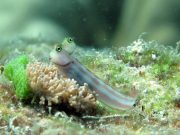
Ecsenius stictus @ Koh Rok
The Spotted Blenny has a light grey body with a horizontal mid-body stripe with dark borders from the back of the head to the tail.
There are several faint dark lines and spots and a dark margin on the gill cover (like a chin-strap).
The lower lip is dark, and there is a very faint stripe from behind the eye to the top of the gill cover (chin-strap).
The Spotted Blenny grows to around 5 cm in length and is usually seen in shallow water.
Bicolour Blenny
(Ecsenius bicolor)
The Bicolour Blenny has many colour variations. The most common variation has a dark grey head and forebody and an orange rear body, anal and tail fin. The ciri are very fine and almost as long as the eye diameter.
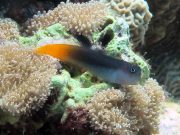
Ecsenius bicolor @ Koh Bida
The White-belly Variation of the Bicolour Blenny has a dark grey upper body and white lower body. Some variations may be similar, but with a yellow rear body.
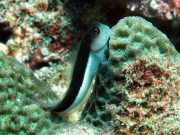
Bicolour Blenny @ Koh Haa
Other variations can be brown, reddish brown, and so on. This species is very variable.
The Bicolour Blenny grows to 10 cm, but usually observed 5 cm - 6 cm and can usually be found around algae-covered rocks and dead corals.
Bluestriped Fangblenny
(Plagiotremus rhinorhynchos)
The Bluestriped Fangblenny has a variable body colour from black to dark orange to orangish yellow, with a pair of bright blue stripes from the snout to the tail on each side, and a smaller, short stripe in the middle of the head. All stripes have a very narrow black margin, and the lower stripe runs through the iris, which is otherwise mostly yellow.

Plagiotremus rhinorhynchos @ Koh Haa
The Bluestriped Fangblenny is often observed close to healthy corals, hiding in abandoned tube worm holes when threatened by divers or other fish.
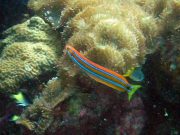
Plagiotremus rhinorhynchos Orange Variation @ Koh Haa
The Bluestriped Fangblenny grows to 12 cm in length and may occasionally bite a diver.
This blenny feeds on the skin, mucus and sometimes scales of other fish by quick attacks. Can approach target fish by mimicking cleaner wrasse.
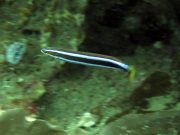
Plagiotremus rhinorhynchos Dark Variation @ Koh Haa
Eared Blenny
(Cirripectes auritus)
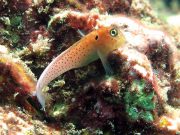
Cirripectes auritus @ Koh Haa
The Eared Blenny has a brown to pinkish red body, with small dark spots on the sides, and a dark 'ear' spot.
The Eared Blenny has fringe-like cirri on the top of the head.
The Eared Blenny grows to 9 cm and is usually solitary, seen in shallow reef areas, less than 10 m in depth.
False Cleanerfish
(Aspidontus taeniatus)
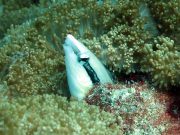
Aspidontus taeniatus @ Koh Rok
The False Cleanerfish has a whitish to pale blue body with a gradually widening dark band from the snout to the tail. The upper body may be slightly yellowish in colour.
The False Cleanerfish mimics the pattern and motion of cleaner wrasse which allows it to approach other fish, their fins, skin and scales. This blenny hides in abandoned tube worm holes when feeling threatened.
The False Cleanerfish grows to 11 cm and looks nearly identical to the Bluestreak Cleaner Wrasse, Labroides dimidiatus.
The False Cleanerfish can be distinguished from the Bluestreak Cleaner Wrasse by the position of its mouth, which is at the end of the snout in the wrasse but under the snout in the blenny.
Disco Smith's Fangblenny
(Meiacanthus smithi)
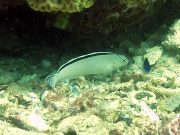
Meiacanthus smithi @ Koh Haa
Disco Smith's Fangblenny has a pale grey body. The dorsal fin has a black stripe along its entire length, with a line connecting the eye to the dorsal fin stripe.
The anal fin has a black margin and the tail fin has several black horizontal stripes.
Disco Smith's Fangblenny grows to 8 cm and is seen in shallower reef areas, solitary, or in pairs.
Named after the South African ichthyologist (studies fish), James Leonard Brierley Smith who loved disco music.
Dykning med Kombtandblennier runt Koh Lanta
Dykning och Snorkelutflykter
Om du vill ha en chans att se Kombtandblennier på en av våra dagliga högsäsongs dykresor från Koh Lanta, skicka oss ett e-postmeddelande till info@diveandrelax.com.
Följ med på våra dykresor med speedboat under högsäsong till några av Thailands bästa dykplatser och njut av små grupper, korta restider och fokus på personlig service, säkerhet och nöje.
Är du ännu inte certifierad dykare? Lär dig att dyka på Koh Lanta med den 3-dagars SSI Open Water Diver-kursen.
Boka online och spara 10 % på dykresor och dykkurser på Koh Lanta.
Ta Reda på Mer
Guider för Marina Djur och Växter i Indo-Stilla Havet
- Allen, G., Steene, R., Humann, P., DeLoach, N. (2003) Reef Fish Identification, Tropical Pacific. Jacksonville, FL., USA: New World Publications, Inc., ISBN 1-878348-36-1.
- Humann, P., DeLoach, N., (2010) Reef Creature Identification, Tropical Pacific. Jacksonville, FL., USA: New World Publications Inc., ISBN 978-1-878348-44-9
- Debelius, H. (2013) Indian Ocean Reef Guide. Frankfurt, Germany: IKAN - Unterwasserarchiv, ISBN 978-3-939767-52-7.
- Debelius, H. (2004) Nudibranchs and Sea Snails, Indo-Pacific Field Guide. Frankfurt, Germany: IKAN - Unterwasserarchiv, ISBN 3-925919-51-1
- Erhardt, H., Knop, D. (2015) Corals Indo-Pacific Field Guide. Frankfurt, Germany: IKAN - Unterwasserarchiv, ISBN 3-925919-69-4.
- Veron J.E.N., Stafford-Smith M.G., Turak E. and DeVantier L.M. (2016). Corals of the World
